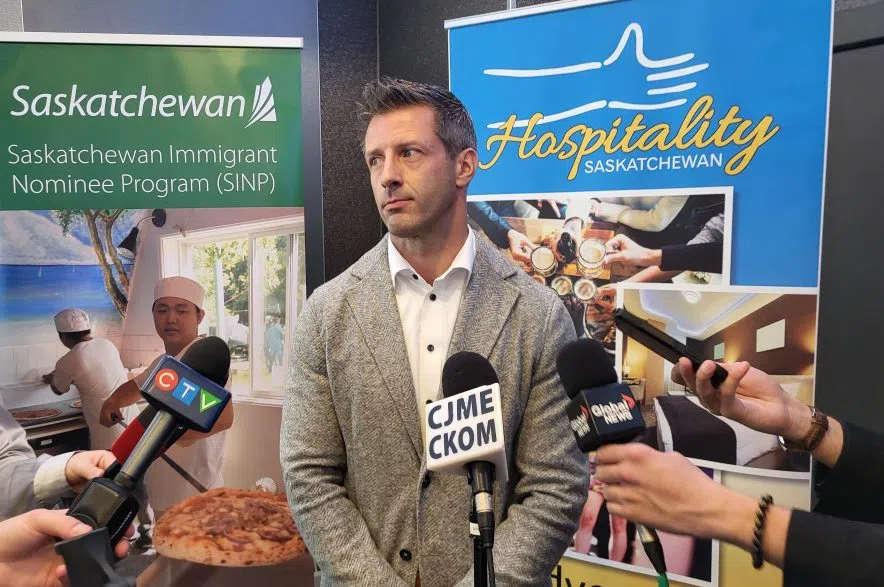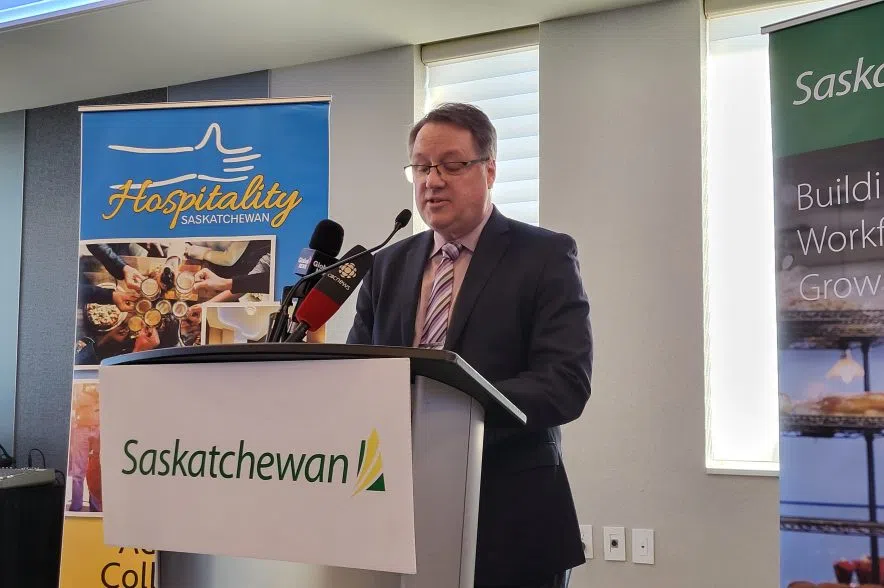Saskatchewan’s tourism sector is still trying to get back on its feet after several tough years.
To deal with labour shortages in the industry, the Government of Saskatchewan announced $400,000 in funding with Hospitality Saskatchewan on Tuesday.
Jim Bence, Hospitality Saskatchewan’s CEO, said the investment was a welcome contribution.
“We were already pre-pandemic, when it came to labour, in the glue,” Bence told reporters at a media event.
“It was really a tough landscape. We’re competing with so many different industries, the pandemic hit and what it did is I think that it really illuminated the challenges that we had. And we were the first hit and the hardest hit and our recovery has been really tough.”
The province said the investment is part of Saskatchewan’s Labour Market Strategy, which it unveiled in March.
The investment is aimed to help Hospitality Saskatchewan recruit, settle and retain both local and international workers.
The funding also has consideration towards strengthening partnerships with Indigenous communities to grow Indigenous participation in the workforce.
“The recruitment and retention of people working in this industry and all industries is indeed critical,” said Environment Minister Christine Tell, who was at the event in place of Immigration and Career Training Minister Jeremy Harrison.
Bence said the hospitality industry is a foundation to economic growth in the province.
“Seven out of 10 kids get their very first job in our industry. Eight out of 10 First Nations and Indigenous kids get their very first job in our industry,” he said.
Bence said skills that people learn while working in the sector — like organization and conflict resolution — are invaluable and can be carried over whether they remain in the industry or not.
He said it was difficult for the sector to compete with the wages and benefits offered by other industries.

Ryan Urzada with Regina’s Atlas Hotel said the pandemic severed the connection that many young people had to the industry. (Daniel Reech/980 CJME)
Ryan Urzada, the chief experience officer at Regina’s Atlas Hotel, said the pandemic severed the connection that a lot of young people had to the industry.
“We find ourselves starting over … Take my front desk: We’d have 12 people in our front desk, you’d hire one new person and those other 12 people would sort of embrace that person, take turns (and) take shifts helping bring them into the fold …,” he said.
“On a small team of 12 people, a new person had an impact. Now, bring six or seven new people onto that same 12-person team where half of them are experienced and half of them are brand new and it’s an overwhelming challenge to get those people up to speed to get that experience (and) that level of knowledge that was lost during the pandemic.”
Urzada said when you extrapolate that phenomenon to the entire hotel, it’s like opening a brand-new hotel where half of the people are experienced and half are brand new.
“It’s challenging indeed,” he said.
Urzada said Atlas’ wages are above minimum wage but not by much. He said the hotel can’t charge as much on a nightly basis as ones in places like Banff, Vancouver or Toronto.
“For us to be able to affordably run a hotel of this size or many of our other hotels or restaurants, (our workers) are typically young people or inexperienced people that are learning it for the first time and so it is a challenge to hire and retain those folks over time,” Urzada said.
Asked if the funding will enable Atlas to increase its minimum wage, Urzada said that was contingent on the marketplace and profitability of the hotel.
As for how the investment will help Atlas specifically, Urzada said he didn’t know yet how it affect the hotel as he had only learned about the announcement within the last 24 hours.
Bence said operators are under a “staggering” amount of pressure due to things like inflation. He said that restaurant bankruptcies went up 112 per cent in January 2024 compared to the previous year.
When asked, Urzada said the carbon tax is a contributing factor. He noted the Atlas had to pay about $70,000 towards the carbon tax last year.
“That’s $70,000 that isn’t going to wage increases, it’s $70,000 that doesn’t go into reinvestment or expansion,” he said.
“It’s quite frankly $70,000 that erodes any profit margin that we might have that we could use to actually have confidence in our business and that’s before the carbon tax increase.”











